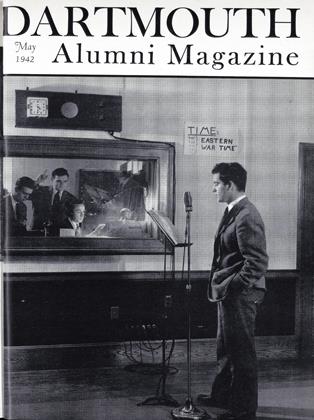ONE OF THE INCREDIBLE TALES of adventure, suffering and heroism that have been coming out of the war in the Pacific concerns Lieut. Frederick C. Eaton Jr. '4O, who emerged from the jungles of the south seas after having been on a plane that was lost and unreported for six weeks.
Lieutenant Eaton, piloting an American Flying Fortress with a crew of seven, got separated from his five companion bombers during a dog fight.
"I know we hit a transport and shot down two Zeros for sure, and I think we got another one," he said.
But then his bomb rack jammed and he had to break flying formation to make a second run over a target. The Zeros caught up to him and separated him from the other bombers, chasing him for forty minutes before he could shake them off. Gas was running short and, seeing what looked like a perfect landing field, he dropped down only to find the grass "saw-edged stuff ten feet high in a swamp with six feet of water in spots." No one was hurt but all food was lost in the water.
Hacking their way through the jungle, they made eight miles in four days surrounded by mosquitos, spiders, scorpions and crocodiles. A raft, made on an island of wood none of them knew, sank but they finally ran into two natives, former headhunters and cannibals, who fed them sago, corn, taro, watermelon and bananas, and gave them canoes. By this time, four of the men had developed tropical ulcers but they trekked through bush tracks at ten miles a day, finally reaching a village with a white assistant registrant magistrate and an Anglican mission. A radio message was sent but it took ten days to get an answer. After more arduous travel through the bush, with six of the eight now sick, they arrived at the coast where a launch was supposed to be, only to find the launch had been destroyed.
Finally picked up by a 50-foot relief schooner, the Americans were taken to "what might be termed civilization" and flown to Australia. The hands of all were badly torn and only Lieutenant Eaton and one other were not hospitalized.
"I'm healed now and anxious to get back and get even with the Japs for that six weeks of hell," was Lieutenant Eaton's message from Australia.
He is the son of Frederick C. Eaton 'll of Scarsdale, N. Y., and was one of six Dartmouth students chosen in 1939 to enter the Lincoln Airplane and Flying School in Lincoln, Nebraska, where he topped his class and was the first of the group to solo. He was commissioned a Lieutenant in the U. S. Army Air Corps in 1940.
NOTE: Word just received from Eaton'sfather reports that he has since been promoted to the rank of Captain.
 View Full Issue
View Full Issue
More From This Issue
-
 Article
ArticleDartmouth Broadcasting System
May 1942 By WILLIAM J. MITCHEL JR. -
 Class Notes
Class Notes1917*
May 1942 By EUGENE D. TOWLER, ARTHUR P. MACINTYRE -
 Sports
SportsBig Green Teams
May 1942 By James L. Farley '42 -
 Class Notes
Class Notes1918*
May 1942 By ERNEST H. EARLEY, RICHARD A. HOLTON -
 Article
ArticleWar Program Takes Hold
May 1942 -
 Article
ArticleThe Undergraduate Chair
May 1942 By Edward J. Rasmussen '42
Article
-
 Article
ArticleTHE AEGIS
JUNE, 1907 -
 Article
ArticleTHE GRADUATE CLUB
December, 1911 -
 Article
ArticleLast month THE MAGAZINE had something to say concerning the advisability
January 1916 -
 Article
ArticleOCTOBER MEETING OF THE TRUSTEES—EXTRACTS FROM THE MINUTES
November, 1916 -
 Article
ArticleOUTING CLUB ACQUIRES TRACT OF LAND
April 1921 -
 Article
ArticleMasthead
October 1980

